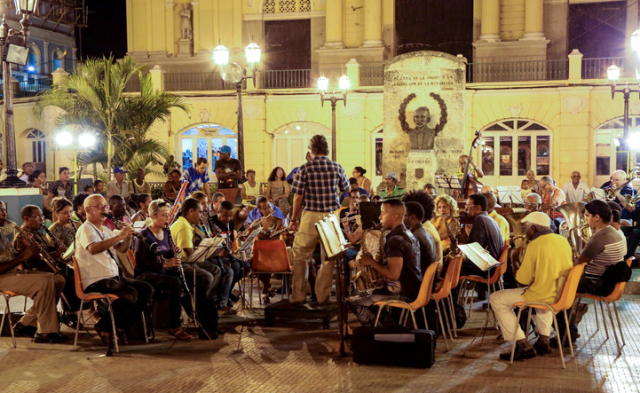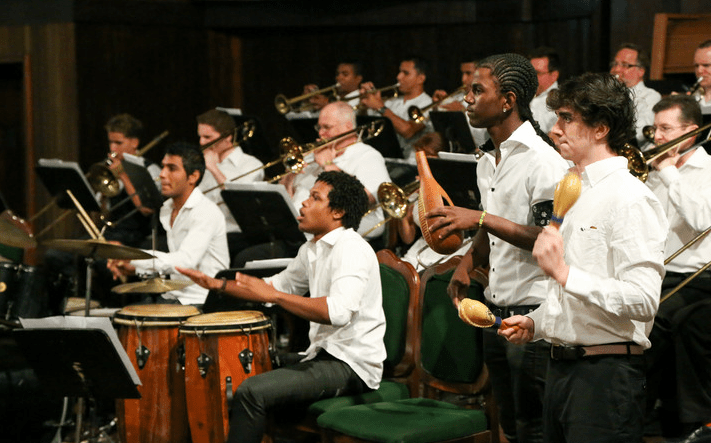BTN.com staff, September 21, 2015
South Florida and Cuba are separated by about 90 miles of water and 1,000 miles of culture. Penn State professor and professional trombone player Mark Lusk found that to be the case when he brought a group from the United States to the island nation for the first time in 2014.
?It feels like you?re in a different dimension,? he said. ?I never thought it would be that way.?
?They picked us up in this old Ford 1950s truck with bench seats,? recalled Penn State graduate student Wesley Thompson, who went on that first trip. ?The ride was just incredible because once we got out of town, we saw the heart of what Cuba really is.?

For the past two years, Lusk has taken a handful of Penn State music students and faculty - along with a similar group of Richmond University musicians - to the island to play in various concert series with a consortium of Cubans. The first year, the group brought down a selection of traditional American swing numbers, which meshed well with the more rhythmic Cuban pieces. For this year?s visit, Lusk picked a more classical-oriented set.
The first two trips were so successful, they are now plotting their third trip in May 2016. Lusk said he?s planning to incorporate more dance and visual arts into the production.
Lusk planned these trips so students could not only get unique experiences in musical performance, but also learn about another culture and promote goodwill between the two countries.
?As far as we knew, that [first visit] was the first time since the revolution that anything like that has really happened,? he said. ?The great thing is it?s not just us going down and doing something. The way we?ve interacted with the students there, that?s why it?s been so successful. The collaboration has been really awesome. They see that as a win, and so do we.?
Lusk said the collaboration came about because of his professional and personal ties to Richmond professor Michael Davison, who had made a number of trips to Cuba in the past.
?Every summer we?d be hanging out at Interlochen [music camp in Northern Michigan], and I?d hear these stories about him going over to Cuba,? Lusk said. ?And I?d say, ?Hey, how do I get involved with this?? That?s how we came up with the idea.?
Lusk said nothing can really prepare students for what they?ll see when they?re down there.
?I warned them, especially with that first group that went, I said, ?I don?t know when you?ll hear it, but you?re going to hear somebody playing, and it?s going to define what real music-making?s all about,?? he added. ?We experienced it immediately, and it stayed with us throughout the trip.?
Thompson is still able to recall his trip in sharp detail. He likened the music scene in Santiago de Cuba - the town where they stayed - to New Orleans, ?except even more.?
?Just along the three-block we saw people playing music,? he said. ?It was everywhere. And none of it was recorded. This was people playing live music. From the moment we got there, it was so much more than music. We were hearing all sorts of new sounds and rhythms. We knew we were going to be humbled.?
[btn-post-package]While it?s hard to ignore the immense poverty many of the Cuban people live in, Thompson said he was amazed at the way they managed their lives - and especially their love for music. He said he found some of the most amazing musicians playing student-level instruments. He recalled one horn player having to stuff paper into his instrument because the mouthpiece was the wrong size.
Even in the less-than-ideal conditions, he was amazed by their skill and passion, and found they set a great example for musicians everywhere.
?Just to try to capture some of that in-the-moment feeling that you have,? he said. ?Don?t let everything else get in the way and just play.?
Thompson said it?s difficult to even articulate what music means to the people in Cuba.
?It?s part of their blood,? he said. ?The culture is just so ingrained. It?s very much in the present. Music is life.?
He said it?s an experience that made him appreciate the gift of music even more when he returned to Happy Valley.
?It?s almost cliché to say it is life-changing, but it really is,? he said. ?People are so present in the moment. They?re not necessarily worrying about stuff. They have things, but they don?t really own them. The music is one of the few things that they entirely own. When that happens, it?s on a whole other level. It?s an infectious, contagious, emotional atmosphere to be in.?
By Matthew Wood







